Kidneys
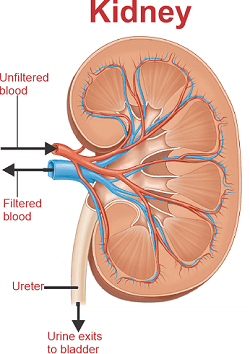
Most people have two kidneys, which are located in the lower back. The most important function of the kidneys is to filter the body's blood. They also eliminate waste and maintain fluid balance in your body. Kidney disease, infections, and cysts are typical kidney diseases.
Function of Kidneys
Your urinary system includes your kidneys. Your blood is filtered by two bean-shaped organs called kidneys. The kidney filters around 200 quarts of the body's blood in a single day. This much blood is enough to fill the whole bathtub. Your kidneys remove waste during this process, which causes urine to leave your body (pee). The average person urinates two quarts every day. The remaining 198 quarts of fluid are used again by your body.
The kidney's main function is to balance the electrolyte and water balance of the blood. Salt and potassium are two examples of the important minerals known as electrolytes.
Risk of Developing Kidney Problems
People already suffering from diabetes or high blood pressure are at risk of developing kidney diseases. Your kidneys can also be harmed by trauma or accidents, such as automobile accidents or sports injuries.
Kidneys Functioning
Your kidneys serve a variety of crucial purposes. They purge waste products and pollutants from your blood. Acids, muscle waste (creatinine), and nitrogen waste (urea) are typical waste products. They help in the removal of these chemicals from your body. Every minute, your kidneys filter around half a cup of blood.
Process:
- A sizable blood channel, the renal artery, transports blood to your kidneys.
- Your kidney's tiny blood veins filter the blood.
- The filtered blood is returned to your bloodstream through a sizable blood channel known as the renal vein.
- Urine gets to your bladder through muscular tubes called ureters.
- Until you urinate to release it, your bladder retains urine (peeing).
While maintaining the electrolyte balance of the body fluid, the kidney also takes care of the ph balance. It also produces the hormones erythropoietin and calcitriol. Vitamin D in the form of calcitriol aids calcium absorption in the body. Your body uses erythropoietin to create red blood cells. Over each kidney is an adrenal gland. Hormones such as cortisol, which helps react in response to fluctuating stress level, is created by kidneys.
- Controlling metabolism is another function that cortisol has.
- Inflammation reduction.
- Blood pressure control.
- Increasing the level of blood sugar.
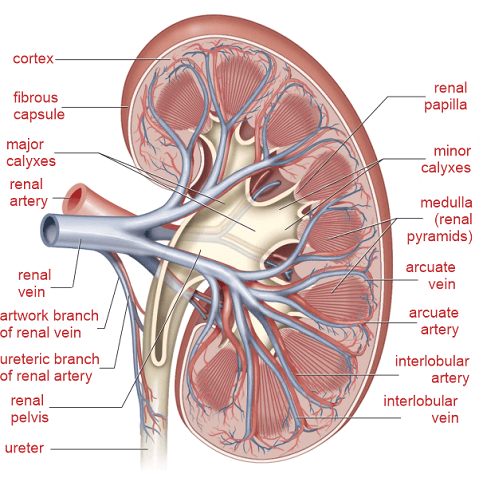
Filtration of Blood
A nephron is the basic unit of kidneys that serves the purpose of blood filtration. Nephrons are a type of filtering unit; one kidney has millions of nephrons. Each nephron includes:
- Glomeruli: The initial stage of filtering your blood is by clusters of microscopic blood arteries called glomeruli. The renal tubules get the filtered chemicals next. The procedure in question is known as glomerular filtration.
- Renal tubules: Your body's microscopic tubes reabsorb and discharge minerals, nutrients, and water (including sodium and potassium). Diffusion is the method through which the tubules remove fluids, waste, and extra acid. The remainder of your body's waste is sent to the collection areas of your kidneys. It eventually exits your body as urine.
Are Kidneys Necessary for Life?
One kidney is enough to sustain life. A radical nephrectomy may involve the removal of one of your kidneys. A person might only have one kidney if :
- One of their kidneys has been removed due to an accident or kidney failure.
- They made a kidney donation for a kidney transplant to someone else.
- They had only one kidney when they were born (renal agenesis).
- Born with two kidneys, however, only one of them is functional (kidney dysplasia).
Location of Kidneys in Body
Your kidneys are located beneath your stomach and directly below your ribcage. On either side of the spine, one kidney is located. Your diaphragm and intestines are where your kidneys are located. Each kidney is linked to the bladder by a ureter.
Components of Kidneys
Your kidneys are very intricate, multi-part organs. Your kidney anatomy is composed primarily of the following:
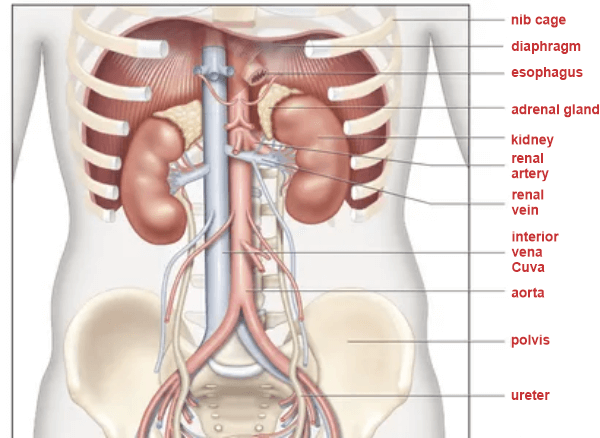
1. Renal Capsule (renal capsule)
The kidney is covered by a three-layered capsule called a renal capsule. The capsule comprises connective tissue or fat and serves the purpose of protection. It strengthens your kidneys' stability, guards against damage, and connects your kidneys to the tissues around them.
2. Kidney Artery
A sizable blood vessel, the renal artery, regulates blood flow to the kidneys. Most people's renal kidneys pump about 5 cups (1.2 litres) or so (1.2 litres) of blood every minute to their kidneys while they are at rest.
3. Renal Cortex
It is your kidney's outermost layer, where the nephrons (blood-filtering cells) start. Red blood cells in the body are produced due to a specific hormone called erythropoietin (EPO). The renal cortex produces this hormone.
4. Renal Medulla
The interior of your kidney is known as the renal medulla. Most nephrons, along with the renal tubules and glomeruli, are present. Urine is transported to the renal pelvis by the renal tubules.
5. Renal Papilla
These structures, which resemble pyramids, carry urine to the ureters.
6. Renal Pelvis
Urine is collected and sent down two ureters by this funnel-shaped device. The bladder is where urine is deposited after it has traveled from the ureters.
7. Renal Vein
This one is the primary vein that transports filtered blood from your kidneys and returns it to your heart. A renal vein can be found in each kidney.
Color of Kidneys
You have reddish-brown kidneys.
Weight of Kidneys
Your kidneys' weight fluctuates. Your height, weight, age, body mass index (BMI), and location could all differ it.
- Your right kidney could weigh anywhere from 1/5 to around 1/2 lbs. if you were born a man (79 grammes to 223 grams). The weight of your left kidney can range from a little under 1/5 to a little over 1/2 pounds (74 grammes to 235 grams). One to four tennis balls' worth of weight could be what your kidneys weigh.
- Your right kidney might weigh slightly more than 1/10 and 3/5 pounds if you were born a woman (55 grammes to 274 grams). Your left kidney could be between 3/20 and somewhat less.
What Damages The Kidneys?
Your kidneys serve some vital roles in your body. They may experience a wide range of problems. Typical problems that affect your kidneys include:
- Chronic kidney disease (CKD): Your kidney function may be reduced if you have CKD. The major factors contributing to CKD are high blood pressure and diabetes.
- The most common kidney cancer is renal cell carcinoma.
- Kidney failure, also called renal failure, can be divided into two categories based on the speed of infection. It is called acute kidney failure, when it becomes worse very quickly. Other when infections proceed rather slowly but permanently, which is called chronic kidney failure. Kidney function is completely lost in end-stage renal disease. Once the kidney has stopped working completely, the artificial kidney system filters the blood. This system is called dialysis.
- A kidney infection known as pyelonephritis can develop if germs ascend your ureters and enter your kidneys. Symptoms from these infections appear suddenly. Antibiotics are used to treat them by medical professionals.
- Kidney stones: Kidney stones can stop the urine flow and cause crystals to accumulate in your urine. These stones may fall out on their own. Medical professionals might provide therapy to separate or eliminate them in other situations.
- Renal (kidney) cysts: Your kidneys develop fluid-filled sacs known as kidney cysts. These cysts may harm the kidneys. Medical professionals can take them out.
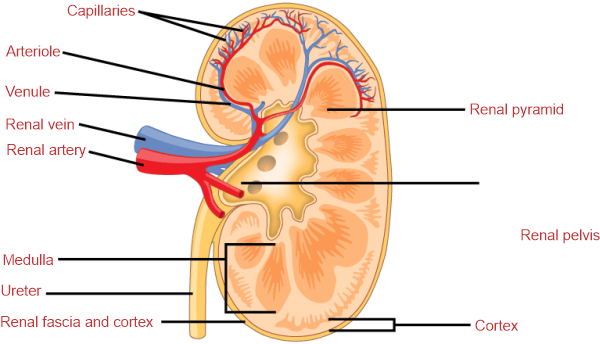
- Cysts develop on your kidneys due to polycystic kidney disease (PKD). PKD is a hereditary disorder. As a result kidney failure and excessive blood pressure could occur. People with PKD require ongoing medical observation.
- Countless different conditions may impact your kidneys. These conditions include, among others:
- Acidosis: Excess acid builds up in your kidneys, leading to various health issues. It might endanger life.
- Your kidneys become inflamed, often due to specific antibiotics, which can cause kidney failure. This condition is known as acute or interstitial nephritis.
- Azotemia: Your kidneys accumulate nitrogen waste. Azotemia may be fatal if untreated.
- Caliectasis: When you have too much fluid, your calyces, where urine collection starts, enlarge. Caliectasis may lead to renal failure if left untreated.
- Nephropathy brought on by diabetes or hypertensive nephropathy: Kidney damage results from uncontrolled diabetes or persistently high blood pressure.
- Glomerular illnesses: Your glomeruli may become inflamed or suffer damage due to glomerular diseases. Several diseases can cause kidney failure.
- Nephrotic syndrome and minimal change disease: Nephrotic syndrome and minimal change disease cause your kidneys to leak too much protein into your urine.
- Papillary necrosis: Kidney tissue fragments in the papilla and medulla perish. Kidney failure can result from tissue fragments breaking off and clogging your kidneys.
- Proteinuria: If you have proteinuria, your kidneys likely contain much protein. It might indicate kidney injury.
- Pyelonephritis: Your kidneys swell as a result of this acute kidney infection. It might endanger life.
- Uremia: Your bloodstream picks up toxins that often exit your body through urination. Uremia can be fatal if it is not treated.
What are the Initial Indications of Kidney Problems?
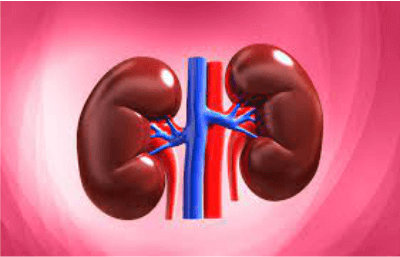
The majority of kidney issues do not initially show any symptoms. As kidney disease worsens, you could observe:
- Muscle cramping: Electrolyte imbalances make your muscles rigid.
- Blood cells can leak into your urine when the filters in your kidneys are damaged, resulting in dark urine or urine containing blood.
- Bubbles in your urine may indicate an overabundance of protein.
- Dry, itchy skin is caused by a mineral and nutritional imbalance in the blood.
- More frequent urination: You urinate more frequently when your body has trouble filtering waste.
- Reduced kidney function might make your body hang onto protein and sodium, causing oedema in the form of puffy eyelids or swollen ankles and feet.
Kidney Problem Examinations
Medical professionals use numerous tests to assess kidney function and identify renal issues. Your provider might advise:
- Using advanced imaging, kidney obstructions or abnormalities can be seen on X-rays, CT scans, MRIs, ultrasounds, or nuclear medicine images (blockages).
- Blood testing: Blood tests demonstrate the efficiency of your glomeruli in filtering blood.
- Kidney biopsy: A little portion of your kidney tissue is removed to be examined under a microscope during a kidney biopsy.
- A tube (endoscope) is inserted through the urethra into the bladder and ureters by a medical professional to check for anomalies.
- An analysis of your urine is called a urinalysis. It measures particular substances like blood or protein.
What Can I Do to Maintain Kidney Health?
It is crucial to get routine examinations, blood testing, and urine analysis to assess the condition of your kidneys. You can lower your likelihood of acquiring a kidney condition by:
- Avoiding or giving up using tobacco products and smoking. Your healthcare physician can assist you in locating quitting options.
- Eliminating excessive salt, which can disturb the mineral balance in your blood.
- consuming water
- By increasing everyday exercise, and lowering the high blood pressure.
- NSAID usage should be controlled. If taken in excess, NSAIDs might harm the kidneys.
- Maintaining the weight
- Regularly checking the blood pressure
- Regularly check the blood sugar levels.
Effect of Water on Kidneys
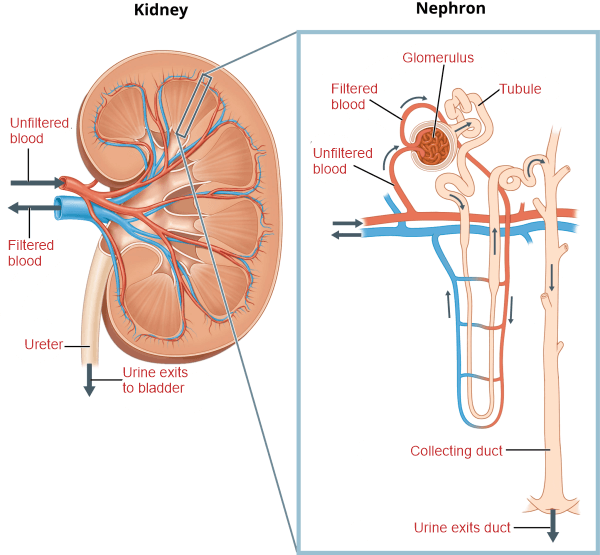
You can protect your kidneys by drinking enough water. Water assists your kidneys in eliminating wastes and toxins through urination. It also supports the health of your blood arteries, making it simpler for blood to carry essential nutrients to your kidneys.
Kidney stones and urinary tract infections can also be controlled (may even be avoided) by drinking lots of water. When your kidneys are sufficiently hydrated, kidney stones are less prone to develop. This is because when you drink water, you will have to remove the excess water from the body through urination. This way, stones and UTIs can be avoided. The bacteria accumulated in the uterus will be flushed out along with the urine. In general, the colour of your urine can indicate whether or not you are getting enough water. The person who drinks a good amount of water has clear urine; on the other hand, the person whose water intake is less usually passes out concentrated urine, which is dark yellow.
How Much Water Should I Consume Daily to Maintain Kidney Health?
Men and those born into the masculine gender should typically consume 13 cups (3 litres) of water every day. Water should be consumed in the amount of 9 cups (just over 2 litres) each day on average by women.
Could You Ever Consume Too Much Water?
It is possible to consume too much water. A high water intake might result in hyponatremia or water intoxication (primary polydipsia). These diseases could result in seizures, comas, and mental
Is It Back Pain or Kidney Pain?
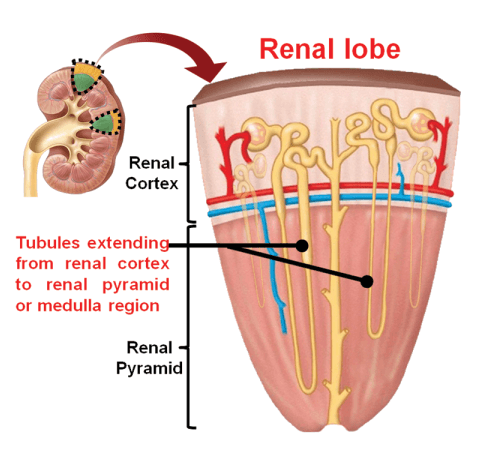
- People frequently mix back pain and kidney discomfort because they are similar.
- Lower back discomfort typically starts there.
- Your back and deeper parts of your body are more affected by kidney discomfort. Most likely, your sides or middle to upper back will hurt (often under your ribs, right or left of your spine). Your abdominal or groin might get more painful as time goes on.
- Your kidneys or urinary system may enlarge or get blocked, resulting in kidney discomfort. Fever, nausea, vomiting, and discomfort when urinating are some symptoms.
Consulting Doctors
Various people may have different symptoms of kidney diseases. If the kidneys have any problem in functioning, you can experience one or many of the following problems -
- Might need to use the bathroom very frequently due to disturbed urination patterns.
- Confusion or difficulty focusing.
- Itchy or dry skin
- Fatigue (extreme tiredness).
- Elevated blood pressure (hypertension).
- Muscle pain.
- Inadequate appetite or food that tastes metallic.
- Vomiting or stomach ache.
- Swelling, particularly in the hands or ankles
If you have the following, then you should routinely test your kidney function.
- A renal illness family history.
- Heart illness.
- Elevated blood pressure
- Overweight or obese.
- Regular intake of specific drugs, such as blood pressure medication.
Conclusion
Your kidneys cleanse your body of waste and filter your blood. Your kidneys also support the fluid and electrolyte balance in your body. A wide range of illnesses may impact your kidneys, so taking precautions is essential to maintain renal health. Routine testing is advised if you are at high risk for kidney issues.
|







 For Videos Join Our Youtube Channel: Join Now
For Videos Join Our Youtube Channel: Join Now









